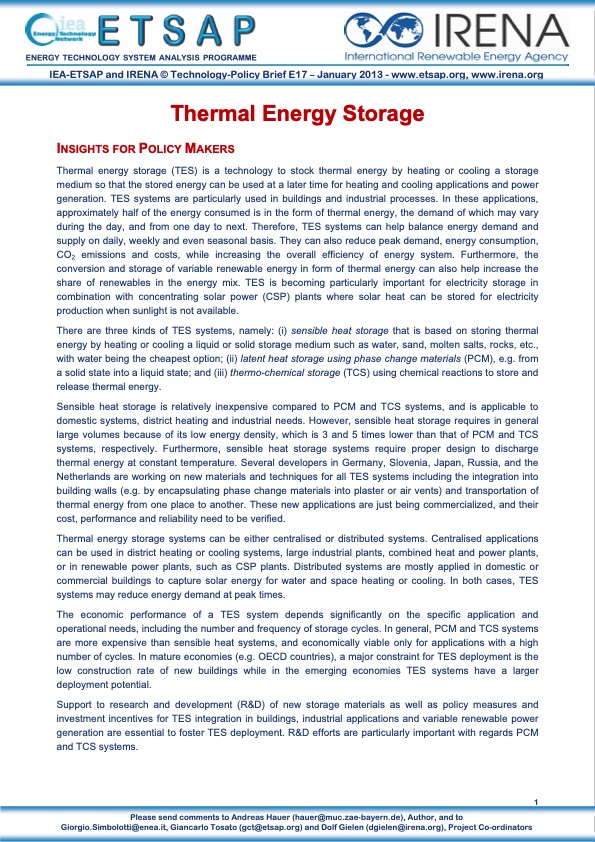
PDF Publication Title:
Text from PDF Page: 001
ENERGY TECHNOLOGY SYSTEM ANALYSIS PROGRAMME IEA-ETSAP and IRENA © Technology-Policy Brief E17 – January 2013 - www.etsap.org, www.irena.org Thermal Energy Storage INSIGHTS FOR POLICY MAKERS Thermal energy storage (TES) is a technology to stock thermal energy by heating or cooling a storage medium so that the stored energy can be used at a later time for heating and cooling applications and power generation. TES systems are particularly used in buildings and industrial processes. In these applications, approximately half of the energy consumed is in the form of thermal energy, the demand of which may vary during the day, and from one day to next. Therefore, TES systems can help balance energy demand and supply on daily, weekly and even seasonal basis. They can also reduce peak demand, energy consumption, CO2 emissions and costs, while increasing the overall efficiency of energy system. Furthermore, the conversion and storage of variable renewable energy in form of thermal energy can also help increase the share of renewables in the energy mix. TES is becoming particularly important for electricity storage in combination with concentrating solar power (CSP) plants where solar heat can be stored for electricity production when sunlight is not available. There are three kinds of TES systems, namely: (i) sensible heat storage that is based on storing thermal energy by heating or cooling a liquid or solid storage medium such as water, sand, molten salts, rocks, etc., with water being the cheapest option; (ii) latent heat storage using phase change materials (PCM), e.g. from a solid state into a liquid state; and (iii) thermo-chemical storage (TCS) using chemical reactions to store and release thermal energy. Sensible heat storage is relatively inexpensive compared to PCM and TCS systems, and is applicable to domestic systems, district heating and industrial needs. However, sensible heat storage requires in general large volumes because of its low energy density, which is 3 and 5 times lower than that of PCM and TCS systems, respectively. Furthermore, sensible heat storage systems require proper design to discharge thermal energy at constant temperature. Several developers in Germany, Slovenia, Japan, Russia, and the Netherlands are working on new materials and techniques for all TES systems including the integration into building walls (e.g. by encapsulating phase change materials into plaster or air vents) and transportation of thermal energy from one place to another. These new applications are just being commercialized, and their cost, performance and reliability need to be verified. Thermal energy storage systems can be either centralised or distributed systems. Centralised applications can be used in district heating or cooling systems, large industrial plants, combined heat and power plants, or in renewable power plants, such as CSP plants. Distributed systems are mostly applied in domestic or commercial buildings to capture solar energy for water and space heating or cooling. In both cases, TES systems may reduce energy demand at peak times. The economic performance of a TES system depends significantly on the specific application and operational needs, including the number and frequency of storage cycles. In general, PCM and TCS systems are more expensive than sensible heat systems, and economically viable only for applications with a high number of cycles. In mature economies (e.g. OECD countries), a major constraint for TES deployment is the low construction rate of new buildings while in the emerging economies TES systems have a larger deployment potential. Support to research and development (R&D) of new storage materials as well as policy measures and investment incentives for TES integration in buildings, industrial applications and variable renewable power generation are essential to foster TES deployment. R&D efforts are particularly important with regards PCM and TCS systems. 1 Giorgio.Simbolotti@enea.it, Giancarlo Tosato (gct@etsap.org) and Dolf Gielen (dgielen@irena.org), Project Co-ordinators Please send comments to Andreas Hauer (hauer@muc.zae-bayern.de), Author, and toPDF Image | ENERGY TECHNOLOGY SYSTEM ANALYSIS

PDF Search Title:
ENERGY TECHNOLOGY SYSTEM ANALYSISOriginal File Name Searched:
E17IR-ThEnergy Stor_AH_Jan2013_final_GSOK.pdfDIY PDF Search: Google It | Yahoo | Bing
Turbine and System Plans CAD CAM: Special for this month, any plans are $10,000 for complete Cad/Cam blueprints. License is for one build. Try before you buy a production license. More Info
Waste Heat Power Technology: Organic Rankine Cycle uses waste heat to make electricity, shaft horsepower and cooling. More Info
All Turbine and System Products: Infinity Turbine ORD systems, turbine generator sets, build plans and more to use your waste heat from 30C to 100C. More Info
CO2 Phase Change Demonstrator: CO2 goes supercritical at 30 C. This is a experimental platform which you can use to demonstrate phase change with low heat. Includes integration area for small CO2 turbine, static generator, and more. This can also be used for a GTL Gas to Liquids experimental platform. More Info
Introducing the Infinity Turbine Products Infinity Turbine develops and builds systems for making power from waste heat. It also is working on innovative strategies for storing, making, and deploying energy. More Info
Need Strategy? Use our Consulting and analyst services Infinity Turbine LLC is pleased to announce its consulting and analyst services. We have worked in the renewable energy industry as a researcher, developing sales and markets, along with may inventions and innovations. More Info
Made in USA with Global Energy Millennial Web Engine These pages were made with the Global Energy Web PDF Engine using Filemaker (Claris) software.
Sand Battery Sand and Paraffin for TES Thermo Energy Storage More Info
| CONTACT TEL: 608-238-6001 Email: greg@infinityturbine.com | RSS | AMP |